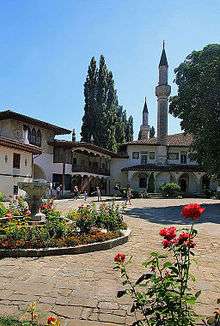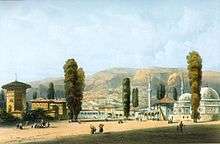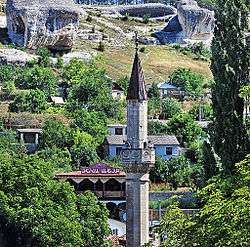Bakhchysarai
| Bakhchysarai Bağçasaray Бахчисарай | ||
|---|---|---|
| City | ||
|
Minaret of a mosque in Bakhchisaray Palace | ||
| ||
.svg.png) Bakhchysarai Location of Bakhchysarai on a map of Crimea. | ||
| Coordinates: 44°45′10″N 33°51′39″E / 44.75278°N 33.86083°ECoordinates: 44°45′10″N 33°51′39″E / 44.75278°N 33.86083°E | ||
| Country |
Disputed: | |
| Autonomous Republic |
| |
| District | Bakhchysarai Raion | |
| Founded | 1532[1] | |
| Founded by | Sahib I Giray | |
| Elevation | 300 m (1,000 ft) | |
| Population | ||
| • Total | 27,448 | |
| Time zone | MSK (UTC+3) | |
| Postal code | 298400 — 298408 | |
| Area code(s) | +7-36554 | |

Bakhchysarai (Ukrainian: Бахчисарáй; Crimean Tatar: Bağçasaray; Russian: Бахчисарáй; Turkish: Bahçesaray; Persian: باغچه سرای) is a city in central Crimea, a territory recognized by a majority of countries as part of Ukraine and incorporated by Russia as the Republic of Crimea. It is the administrative center of the Bakhchysarai Raion (district), as well as the former capital of the Crimean Khanate. Its main landmark is Hansaray, the only extant palace of the Crimean Khans, currently opened to tourists as a museum. Population: 27,448 (2014 Census).[2]
History

Located in a narrow valley of the Çürük Suv river, the first artifacts of human presence in the valley date from the Mesolithic period. Settlements existed in the valley since Late Antiquity. The founding of Bakhchisaray was preceded by the Qırq Yer fortress (modern Çufut Qale), Salaçıq, and Eski Yurt — these are incorporated into the urban area of modern Bakhchisaray.
Bakhchysarai, first mentioned 1502, was established as the new khan's residence by the Crimean Khan Sahib I Giray in 1532. Since then, it was the capital of the Crimean Khanate and the center of political and cultural life of the Crimean Tatar people. After several wars with Russia from 1737 when Burkhard Christoph von Münnich burnt down the capital of the Khanate and the annexation of the Crimean Khanate by the Russian Empire in 1783, it was turned into an ordinary town, having lost administrative significance. However, it remained the cultural center of the Crimean Tatars until the Sürgün (deportation on 18 May 1944).
Name and associations
Spellings of the town's name in different languages include: original Crimean Tatar: Bağçasaray, Turkish: Bahçesaray, Russian: Бахчисарай - Bakhchisaray, and Ukrainian: Бахчисарай - Bakhchysaray. The name comes from Persian باغچه سرای bāghche-sarāy which means the Garden Palace. In Crimean Tatar, bağça means "garden" and saray means "palace".
Russian speakers associate the town with the Romantic connotations of Alexander Pushkin's poem The Fountain of Bakhchisaray (1822). Adam Mickiewicz dedicated some of the finest poems in his Crimean Sonnets (1825) to the landmarks of Bakhchisaray.
An asteroid, 3242 Bakhchisaraj, discovered by Soviet astronomer Nikolai Stepanovich Chernykh in 1979, takes its name after the town.[3]
Attractions
Famous attractions within or near Bakhchysarai are:
- Eski Yurt
- Chufut-Kale
- Khan's Palace
- Orta Juma Jami
- Tahtali-Jami Mosque
- Uspensky Cave Monastery
- Zincirli Madrasa
There is a network of well marked hiking trails around the town. All the main attractions are connected with red-marked trail.
Since 2011 thanks to the support of the Czech Government and USAID the Tourist information centre has been working.
Demographics
| Historical Populations | ||
|---|---|---|
| Year | Pop. | ±% |
| 1930 | 10,450 | — |
| 1939 | 10,891 | +4.2% |
| 1989 | 25,363 | +132.9% |
| 2006 | 26,400 | +4.1% |
| 2011 | 26,215 | −0.7% |
| Source: | ||
In 1930 the population of the city was 10,450. The ethnic groups represented were 7,420 Crimean Tatars, 1,850 Russians, 315 Jews, 205 Greeks, 185 Ukrainians, 50 Germans, 30 Armenians, 30 Bulgarians, and 365 others.
International relations
Twin towns – Sister cities
Bakhchysarai is twinned with:
See also
References
- ↑ Khan Palace in Bakhchisaray
- ↑ Russian Federal State Statistics Service (2014). "Таблица 1.3. Численность населения Крымского федерального округа, городских округов, муниципальных районов, городских и сельских поселений" [Table 1.3. Population of Crimean Federal District, Its Urban Okrugs, Municipal Districts, Urban and Rural Settlements]. Федеральное статистическое наблюдение «Перепись населения в Крымском федеральном округе». ("Population Census in Crimean Federal District" Federal Statistical Examination) (in Russian). Federal State Statistics Service. Retrieved January 4, 2016.
- ↑ Dictionary of Minor Planet Names - p.269
- ↑ "Kardeş Şehirler". Bursa Büyükşehir Belediyesi Basın Koordinasyon Merkez. Tüm Hakları Saklıdır. Retrieved 2013-07-27.
External links
| Wikivoyage has a travel guide for Bakhchysarai. |
| Wikimedia Commons has media related to Bakhchisaray. |
| Wikisource has the text of the 1911 Encyclopædia Britannica article Bakhchi-sarai. |
- Official site of the Palace (English)/(Ukrainian)/(Russian)
- History and monuments of Bakhchisaray (Russian)
- The murder of the Jews of Bakhchysarai during World War II, at Yad Vashem website.

